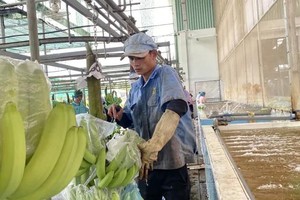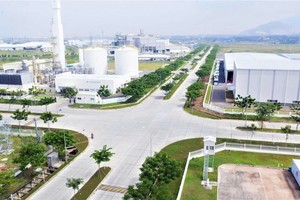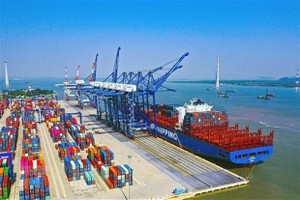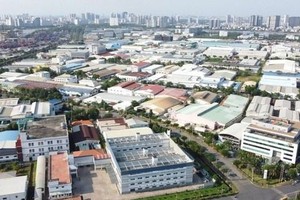 |
Students of Sai Gon University carry out scientific studies to protect environment |
In addition to being one of the first countries in the world to issue a national digital transformation program and strategy, the number of monthly users on Vietnamese mobile applications in the first 6 months of 2023 exceeded 500 million, an increase of nearly 16 percent over the same period.
The Fourth Industrial Revolution (4.0) developed based on three basic pillars including biotechnology, physics and digital technology. The integration of all three areas will bring many opportunities for innovation, including economics.
The 4.0 Industrial Revolution not only created new resources, products and assets but also had a strong impact on social resources including institutions, political structures, society and especially an economic model.
The foundational economy - the part of our economy that creates and distributes goods and services that we rely on for everyday life - has become a new economic model in the twenty-first century and completely changed the way human beings conduct production and business. The model operates as a centralized platform linking diverse sellers and buyers, providing a variety of goods and services.
The foundational economy is a new form of industrial organization and new format that aims to improve efficiency and reduce costs based on digital technology, data drives and platform support, and business process changes, consolidating industry chains and combining multiple enterprises.
Especially in the new economic environment contributed by globalization, computerization and networking, it will serve as the basis for the development of online commerce, having a strong impact on the financial and banking system. goods due to the ability to dematerialize which replace certificates (= paper documents) by a system in which shares, etc. are bought, sold, and stored electronically and disintermediate which reduces or eliminates the use of intermediaries between producers and consumers.
In addition, the foundational economy also provides an opportunity to promote the transformation of traditional manufacturing development strategies; thereby, helping abandon the concept of mass production and scale production, and develop modular flexibility and personalization.
Manufacturing using the foundational economy can solve three strategic problems that the traditional manufacturing industry is facing including high inventory, high costs and insufficient innovation capacity.
Moreover, the transformation of the previous decentralized-oriented management mode to a flat management mode is driven by orders placed in the foundational economy. This kind of economic form will help to exchange information and communicate more effectively, decentralizing point-to-point information to make production and sales of the traditional manufacturing industry more efficient.
Last but not least, industrial transformation and upgrading using information systems and developing open, win-win supply chains with suppliers to become a value-added economy.
The emergence of the platform ecosystem has overshadowed the original industrial model and blurred the industrial boundaries because platform-based enterprises can continuously carry out cross-border operations based on products, core services and integration of business activities to promote industrial transformation and upgrade.
This also helps the traditional manufacturing industry better adapt to international competition in expanding from production links at the low end of the value chain to realize the transformation in strategies and upgrade of traditional manufacturing industries.
Statistics also show that this new model has important practical implications as 60 of the world's 100 largest companies also derive their main income from the foundational economy.
According to statistics from the Wall Street Journal (USA), in just May 2023, Vietnam was among the 5 countries with the largest trading volume on Binance, reaching US$20 billion. It can be seen that the foundational economy has appeared through cross-border platforms such as Google, and Facebook, along with technology ride-hailing applications such as Grab, and GoViet which has completely changed the domestic market.
Vietnamese businesses also have a number of applications such as Zalo, MoMo, Be contributing to the development of the special economy.
In the process of developing the fundamental economy, in order to implement the Government's programs and orientations, it is necessary to build sustainable economic institutions and structures to regulate the effective operation of Government entities, suppliers and developers of foundational economy as well as customers in important areas.
First, a legal framework for the special economic model must be built including recognizing products, assets and intangible resources as new socio-economic resources of the 4.0 era, in addition to the development of appropriate tax policies, plans and strategies for effective and comprehensive socio-economic development of the country in the era of the foundational economy.
Additionally, data privacy and commercialization must be paid attention to as customer data drives the platform economy, so the impact of privacy laws is inevitable.
Third, intellectual property must be protected by registration and use of trademarks, licenses, copyrights, patents as well as appropriate non-disclosure/non-fraud considerations.
Finally, competition and anti-monopoly must be under consideration to ensure healthy competition between supplier businesses and businesses developing the special economy as well as protect consumer rights.
























